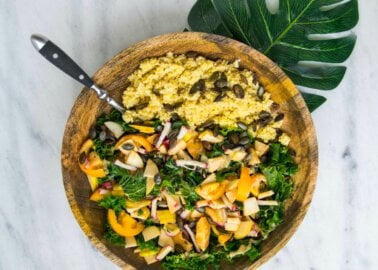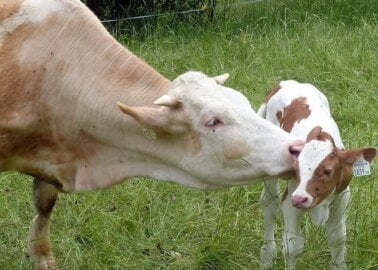Ending Meat and Dairy Production Is Key to Saving Our Planet
Animals endure immense cruelty on meat, egg, and dairy farms. PETA and other organisations have exposed the horrifying reality for these sentient beings time and time again. Now, a groundbreaking report confirms that animal agriculture is severely accelerating climate change – and urges consumers to make drastic changes to their lifestyles.
The scientific evidence gathered by the RISE Foundation shows that Europe’s meat, egg, and dairy production must halve by 2050 in order to meet the emission reduction targets of the Paris climate agreement. It’s a no-brainer that going vegan helps end the inhumane farming of animals, and that could be key to saving the planet.
If you live in a polluted city, it’s obvious that greenhouse-gas emissions (GHGs) from vehicles pollute the atmosphere. We breathe in the toxic fumes, and they sometimes take a toll on our health. Alarmingly, even though we might not feel the direct impact, animal agriculture is a tremendous contributor to GHGs – it produces approximately the same amount as all global transport put together. This includes methane and nitrous oxide from the animals themselves, their manure, and the production of their feed.
The amount of environmental damage caused by the meat, egg, and dairy industries is shocking. According to the report, chemicals such as ammonia and nitrogen oxides leak into the atmosphere and water sources, harming both humans and biodiversity. When water becomes contaminated and oxygen levels deplete, fish and other aquatic animals die or are forced to migrate.
Also mentioned in the report is that animal agriculture has the world’s largest land footprint – and that one of the biggest impacts on biodiversity loss is the destruction of natural habitats in order to grow food for farmed animals. Animal agriculture alone is responsible for 30 per cent of biodiversity losses, and agriculture is the most frequently reported threat to wildlife loss and habitat degradation in Europe. Other negative factors include over-grazing, which has caused soil erosion, nutrient overload, reduced water infiltration, and poorer flood protection – all seen in the UK.
The list of the harmful effects of meat, eggs, and dairy “products” on human health is extensive, spanning all the way from production processes to consumption. This includes the risk of contracting respiratory diseases from ammonia in the atmosphere, increasing evidence that eating processed red meats has carcinogenic effects, and an elevated risk of other health issues, including obesity, diabetes, and heart disease, from consuming animal-derived foods. The report also mentions that over the past decade, research has shown that milk consumption and healthy bones do not go hand in hand.
People around the world are becoming much more aware of and informed about the myths and lies propagated by the meat, egg, and dairy industries as the treatment of farmed animals comes under public scrutiny. Right here in the UK, female animals are repeatedly forcibly impregnated. Their babies are torn away from them, mutilated, kept in filthy and severely crowded conditions, and fed a cocktail of drugs and chemicals which sometimes causes their bodies to become oversized, resulting in numerous health problems. Then, often when they’re only a few months old, they endure a stressful and terrifying trip to the abattoir, where many are killed while still conscious.
But change is happening. In the UK alone, the number of vegans has more than trebled over the last 10 years, and half of them are under 34 years of age. It’s time that we all embraced the change and came together to save animals and our planet – not just for us but for future generations, too.
What You Can Do
The best thing that anyone can do for animals and the planet is going vegan. Not eating meat, eggs, or dairy “products” is the simplest way for each person to spare the lives of nearly 200 animals every year – and to reject the daily cruelty that occurs in abattoirs and on factory farms in the UK and elsewhere. To help you get started, order a free vegan starter kit full of tips and advice for every part of your journey.



